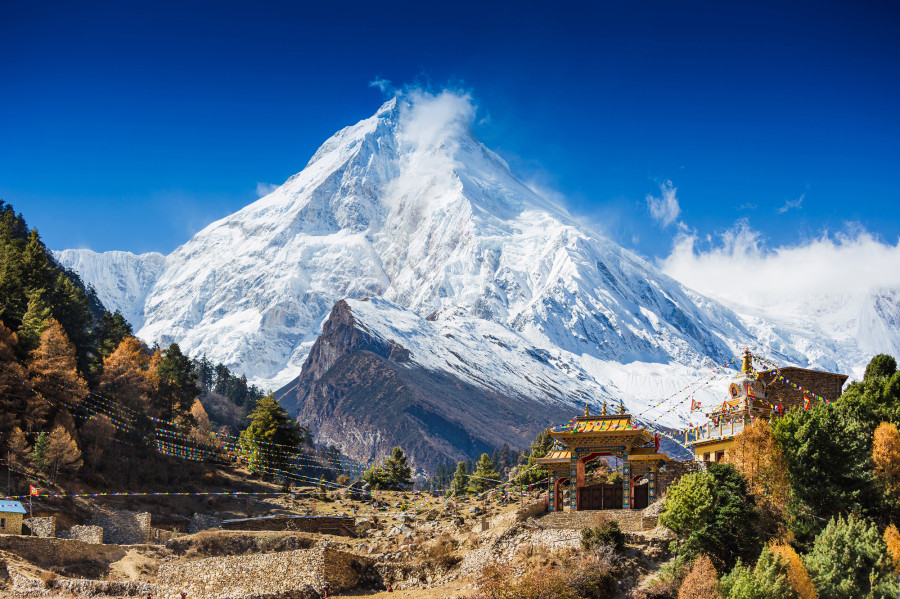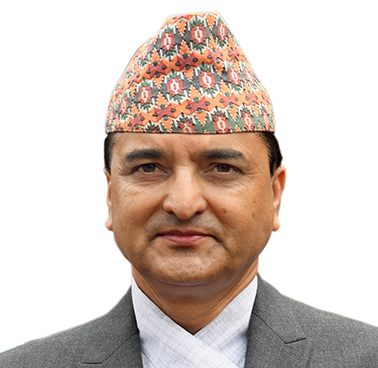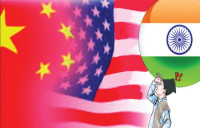Columns
Tourism thrives on teamwork
Visit Nepal Year 2020 can accommodate all people and institutions for the common goal of solidarity for prosperity.
Yogesh Bhattarai
Topped by eight of the world's 14 highest peaks with Everest as the jewel in the crown, sanctified as the birthplace of the Buddha, adorned with spectacular art and architecture, blessed with diverse flora and fauna, and inhabited by 125 ethnic groups speaking 123 languages and dialects, Nepal is a great tourist destination. It is also situated in an enviable location between the two most populous countries in the world, both of which have booming economies. This Himalayan country has been a favourite destination for tourists from across the world for more than six decades.
International arrivals are rising and tourism's contribution to the national economy is increasing year by year. Tourism is now gaining momentum as a phenomenal business activity and is spreading across the country. It is being taken as a source of employment generation, a dependable contributor to national revenue and a catalyst for socio-cultural development. Tourism is one of the most appropriate economic activities, with Nepal having a competitive advantage. It can support businesses ranging from enterprises with a small investment to large projects with international investment. The tourism sector thus has a trickle-down effect which reaches even the lowest strata of society.
Priority sector
For these reasons, the government of Nepal has designated tourism a priority industry, and has formulated laws and policies conducive to it. It has adopted an open sky policy, encouraged foreign direct investment and sensitised the public about the importance and benefits of tourism. Provincial and local governments have also joined the bandwagon, thus making tourism a common agenda for Nepal's economic prosperity.
Tourism thrives on teamwork which requires synergy between basically three major components: the government, private investors and business people, and the community. Unlike other businesses, tourism is rather sensitive, as it is prone to natural, manmade, domestic and international circumstances. On both sunny and gloomy days, Nepal's tourism industry has always steadfastly taken up a strategy riding the vehicle of campaigns to put tourism in the spotlight. Be it Visit Nepal Year 1998, Destination Nepal Campaign 2002-03, Visit Pokhara Year 2007, Nepal Tourism Year 2011 or Visit Lumbini Year 2012, all these past campaigns have served the purpose of drawing international attention to Nepal—that it fondly embraces tourism as an important economic stimulant. Every previous campaign was different in modality and agenda.
Visit Nepal Year 2020 is at our doorstep, with an array of ambitious objectives—a target of 2 million international arrivals, extension of stay, distribution of tourism across the nation, and above all, enhancing Nepal's international image. The challenges are numerous; the commitment is one—making Visit Nepal Year 2020 a grand success. We are focusing on development and upgradation of infrastructure, professionalism in services, smartness in management and inclusiveness in participation.
At this juncture, the focus should be on aviation infrastructure like completing and operating the Gautam Buddha International Airport and Pokhara International Airport, upgrading and expanding Tribhuvan International Airport and other domestic airports, along with starting the construction of Nijgadh International Airport. Progress is speedy, yet we need to keep our eyes on it constantly. Improving Nepal Airlines Corporation is extremely urgent. Several initiatives have been launched to improve the management of Nepal Airlines and expand its services to various foreign cities.
Assuring the international community, aviation experts and travellers about Nepal's aviation safety is the government’s utmost priority. For this, necessary policy reforms have been initiated. We solicit support and cooperation from that end as well. Another very important aspect is physical infrastructure like the construction and upgradation of roads, public transport and complementing facilities and services. This involves multiple stakeholders as well as agencies. It demands a coordinated approach to put our joint efforts to effective results. The reconstruction of most earthquake damaged historical, archaeological and cultural monuments is nearing completion, thanks to the people, agencies, donors and international community who have shown their support for various reconstruction projects.
The existing products and activities need to be enhanced and expanded, and new ones should be developed. There is a need to explore and research new products and experiences to offer to our guests, otherwise repeat visitors—which is a trend in Nepal—will be bored by the same monotonous offerings and the country will fall victim to tourism stereotypes. Skilled and techno-savvy human resources are the need of the hour. The impression of a destination is not a place or a monument alone, it is a composite whole consisting of various elements covering people, facilities, food, comforts, and above all, a sense of security. Developing human resources or training them should be the common agenda of all stakeholders. Put all these things in a spectrum, and the Visit Nepal Year 2020 campaign comes up as a common platform which can accommodate all people and institutions for the common goal of solidarity for prosperity.
Come together
The Visit Nepal Year 2020 campaign aims to send a message that Nepal is a must-visit destination because it offers all kinds of tourism products and activities—nature, culture, adventure, pilgrimage and peace. It has settled the political deadlock in the most efficient way by institutionalising a federal democratic republic that ensures inclusiveness and complies with all democratic values and principles. The country has rebounded from the setback caused by the 2015 earthquake to its previous glory; and it is marching on the path of prosperity with the lofty vision of Prosperous Nepal and Happy Nepali. Let us all unite, and allow tourism to thrive.
***
What do you think?
Dear reader, we’d like to hear from you. We regularly publish letters to the editor on contemporary issues or direct responses to something the Post has recently published. Please send your letters to [email protected] with "Letter to the Editor" in the subject line. Please include your name, location, and a contact address so one of our editors can reach out to you.




 20.81°C Kathmandu
20.81°C Kathmandu















